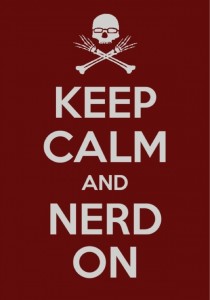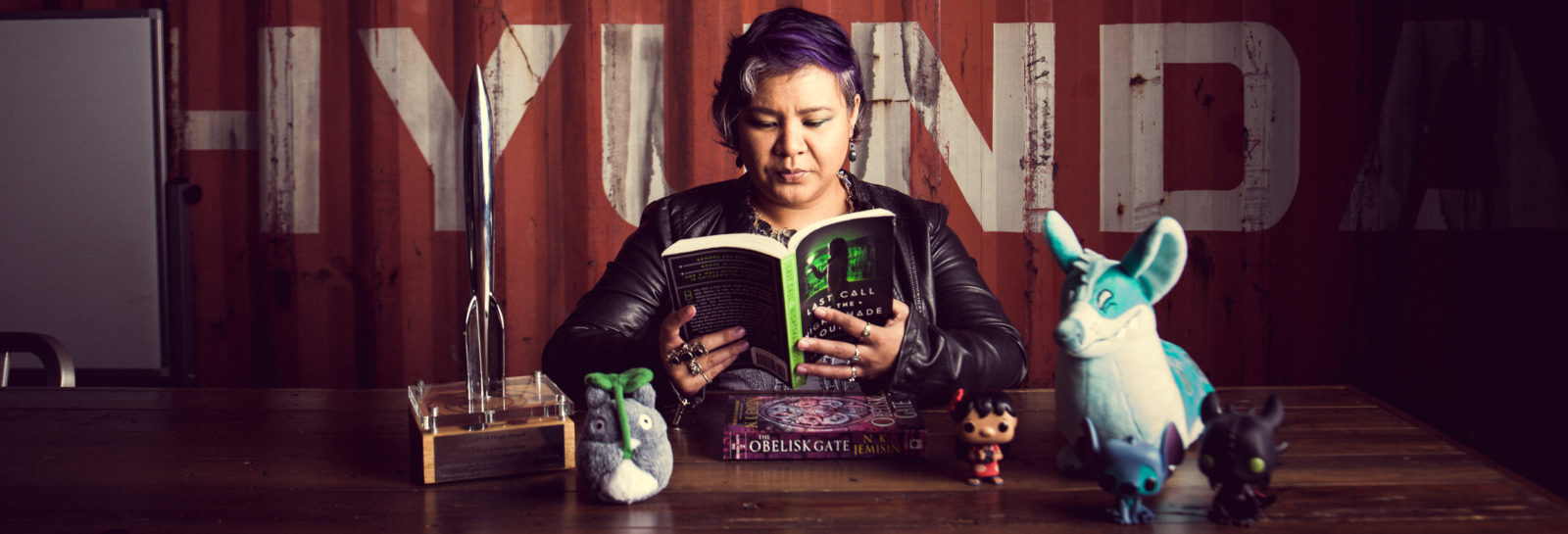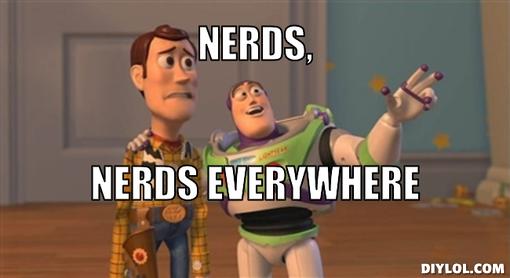Welcome to the Age of the Nerd
The terms “nerd” and “geek” are now claimed by more than the stereotypical loners hiding in their parents basements, surrounded by comic book boxes with a game controller in hand and a jacked-up internet connection as their main link to the outside world. Computer nerds Steve Jobs and Bill Gates became multi-billionaire success stories and statistician Nate Silver became a household name during the 2012 election cycle. Even Hollywood celebrities and professional jocks are in on the action. Vin Diesel is a bona fide D&D lover and founded his own gaming company. Aisha Tyler doesn’t apologize for playing Nintendo and loving it. NFL punter and social justice activist Chris Kluwe geeks out about playing World of Warcraft. James Franco tried to school Stephen Colbert on Lord of the Rings trivia and had his ass handed to him on a platter in front of a live studio audience (not once, but twice).
You can be a nerd about knitting, beer, food, politics, gender theory or fashion. You can geek out over basketball, coding, writing, painting, gardening or home improvement. Name a topic or field of study, and there’s someone willing to call themselves a nerd or a geek for it. You can’t tell who’s a nerd or a geek just by looking at them anymore, because apparently anyone can call themselves a nerd or a geek if they want to.
This makes me about as happy as Hawkgirl in an intergalactic bar brawl.
When I was growing up, being a nerd (much less a girl who was a nerd) was a pretty lonely experience. It wasn’t until I got to college that I started finding people who actually wanted to be friends with me because I got all the nerd references in Clerks. The man I married? Our first conversation was over comic books and Buffy the Vampire Slayer. One of our first dates was to a scifi convention. At our wedding, our officiant (one of our best friends and another nerd) used the “Mah-widge” speech from The Princess Bride and 99% of our guests got and loved the reference.
And now that more people are embracing nerd culture and identifying as nerds? As far as I can tell, that just means there are more people to geek out and share nerdtastic nirvana with, which to the kid who furtively read comic books alone in study hall, looks a net gain for nerds and geeks everywhere. So I’m always surprised to find that not everyone feels that way.
The premise of Ryan Smith’s “Let the Nerds Have Their Word” isn’t anything new. He’s just one more in a long tradition lamenting that a subculture has become too commercialized, been appropriated by mainstream culture and is ready to die. Apparently it’s the death knell of all things nerd if the gates of the clubhouse are opened and anyone who wants to be a nerd or a geek gets to come in, wedgie scars or no wedgie scars.
There’s a very real discussion to be had about the tangled relationship between commercialism and geek culture (a topic that really deserves its own post). But that’s not really the problem, and really, this isn’t about Smith in particular so much as it is about the oft-regurgitated complaints reflected in his piece. Because underneath the martyred tone of sackcloths and ashes in that article is a very real fear about losing one’s identity in the crowd and a resentment that not everyone has to “earn” their stripes as a nerd or geek anymore. While both are understandable, they’re ultimately contributing to a gate-keeping ethos that is hurting nerd culture more than helping it (ahem, “fake geek girl” ridiculousness, I’m looking at you).
I Had to Suffer For It, Why Didn’t You?
It’s not difficult to see how the word “nerd” became, as Smith puts it, “a hard-won badge of honor.” For those of us who were bullied and ostracized, we never forgot how the labels “nerd” and “geek,” when applied to us by others, were code for “socially awkward,” “unattractive,” “too smart,” or “not one of us,” making life lonely and painful.
As a nerdy girl growing up, I got whacked from both sides of the aisle: not only did I lose massive points from the girls’ side for not being “girly” enough because I preferred superhero comics and scifi/fantasy/horror films/tv shows, I had to work twice as hard to prove to the nerd boys that wasn’t “too girly” to belong with them. I had to out-nerd them in basic nerd trivia on a regular basis and put up with a fair amount of sexist behavior, which meant being “tough” and laughing things off instead of “being too sensitive” (if you want a recipe for instilling internalized sexism, this is a great one).
Calling myself a nerd means more than that I love Doctor Who, X-Men and Lord of the Rings, it means that I survived all of that. It’s hard not to find pride in that and there’s nothing wrong with doing so, but it becomes a problem when that pride turns into a justification for excluding other people.
Bullying and social ostracism hurts. They are painful, alienating experiences that do real harm. When geeks complain about how anyone gets to call themselves nerds or geeks these days and then grumbles about how they at least “earned” their nerd cred by being shoved in a gym locker because some jock caught them reading Batman comics under the bleachers, the implication is that being bullied and ostracized is part and parcel with being a geek or nerd, much less necessary to one being able to call one’s self a geek or a nerd. Having been through that nasty experience, I have to ask: Why the hell would I want anyone else to have to go through that sort of crap just for the “honor” of getting to call themselves nerds or geeks without question?
Blogger Ashley Miller highlights the problem with viewing having been bullied or ostracized as something that makes you special:
We all want to be understood and when you’re tortured, you want to have gotten something from it… But the reality is, being bullied doesn’t earn you anything. It doesn’t make you a better person, it doesn’t make you higher ranked in the world of geekdom, gayness, or atheism, and it doesn’t even always give you insight into the world, though sometimes it can. Being bullied is simply a horrible thing that happens to people.
And here’s the thing: How do you know that a jock like Chris Kluwe or an A-list actor like Daniel Craig doesn’t know what it’s like to have suffered being bullied or being left out of something? Being frozen out of a group or being alienated and not fitting in are not unique experiences to geek and nerd culture. They’re universal ones – and being a jock, an A-list actor or an average everyday person who’s never heard of Gene Roddenbery isn’t an automatic barrier to finding something about geek or nerd culture to love.
“Nerd” and “Geek” Don’t Mean What They Used To
Smith opines that because anyone can use them, “geek” and “nerd” have been “overused and misused to the point of meaninglessness.” I agree that the meanings of words have changed, but this is where Smith and I part ways, because I think this is a good thing.
As it’s been pointed out, the words “geek” and “nerd” were practically synonymous with “socially awkward” and “undesirable,” putting anyone labeled with them at the bottom of the social ladder. However, having geeky interests isn’t automatic grounds for social awkwardness. Our social rejection wasn’t just about liking anime or comic books, it was also about our appearance, our attitudes, how well (or not) we read social cues, what kind of car we drove (if we were so lucky) or how rich or poor we were. People still get picked on and shoved out of the “popular” and “normal” crowds for the same reasons – it’s just now they’re using different invectives to hurl at new generations of outcasts.
The fact that people are more willing to embrace the terms “geek” and “nerd” doesn’t mean that the words mean less than they did – it means that their definitions have evolved to being associated less with social undesirability and more with intellectual obsession. You can be a nerd or a geek about practically anything so long as you’re really into it (or would like to be). The fact that being intellectually obsessed with a fandom, hobby or topic doesn’t carry the same level of social penalties as it used to actually represents a tacit acceptance by the mainstream of the things geeks and nerds value the most: curiosity, intelligence and unapologetic enthusiasm.
As an added benefit, widening the definition of who a geek or a nerd is means that the same stereotypes that used to hurt geeks and nerds are less likely to automatically apply to them. If you can’t assume that a jock or a cheerleader can’t also be a nerd, you can’t assume that a nerd is socially awkward or should be your last pick on the kickball team. Opening the gates to geekdom is the chance to shatter stereotypes across the board and introduce more people to the things that we love.
It’s Not Special If Everyone Does It
The problem with defining yourself and the things you like as special because you’re part of a small, select cadre with limited access is that the minute that access becomes opened to others, you’re suddenly not all that special anymore. That tends to make some people cranky, but it’s not without reason.
In an excellent analysis of geek culture’s fear of falsified fandom, The Mary Sue notes how geek culture is rife with terms like “limited edition,” “collector’s items” and “exclusive prints,” and items like membership cards and fan pins that play up an atmosphere of group exclusivity. All of this contributes to a mentality of “false scarcity” and “misinterpreted sense of ownership”:
Like it or not, we think of our fandom as serialized and limited. We’re a possessive lot and it’s not entirely our fault. The notion of an imposter–someone who doesn’t truly care about the personal meaning and value of the items– is threatening to us because they may take from our precious, vulnerable pot.
The opposite is actually true if we think about intangible goods– the vast amount of knowledge across all geek genres from comic books to fantasy literature to video games. There’s such a large universe that the few imposters–if they really existed–are not realistic threats…
When we belong to a community, we develop a sense of deserved ownership… Shareholding grants us certain conceptual privileges: We get to decide who else is in or out. But, really, apart from the tangible products, what do we really own?
We might like to view geek culture as the secret rebel base that only we knew about until the cloaking device malfunctioned. The reality is, as Nick Mamatas points out, geeks and nerds weren’t the only ones consuming the nerd franchises we’re being so possessive of, otherwise none of them would have been considered commercially viable products.
Consider: In just under 30 years, we’ve had six Star Wars films (and three more on the way), multiple TV spin-offs, book tie-ins galore, countless merchandising products and more Star Wars-lite rip-offs than Yoda could shake his walking stick at. The Avengers just won Best Film at the MTV Movie Awards. San Diego Comic Con is a cultural phenomenon that gets coverage in CNN. Forbes has a regular geek culture column and reviews video games. The Batman franchise survived Joel Schumacher. I even got contacted by a Chicago Tribune columnist writing an article about nerd culture recently. This wouldn’t be happening if nerds and geeks were the only ones into these things from the get-go.
The things we love and the identities we claim don’t require that we be scorned for choosing them in order for those things and identities to have merit on their own. Not to mention, geeks and nerds have been forever telling mainstream culture that the geeky things we love are awesome and that being a nerd is fun (so please stop making fun of us!). Now that people are finding out for themselves that we were right and they’ve more or less stopped viewing “nerd” and “geek” as pejoratives, are we really going to turn around and be churlish about it?
Let Everyone Have the Word “Nerd”
Sometimes, claiming an identity is the first step toward becoming that which you claim to be. As my friend Anthony Taylor put it:
If I didn’t have the chance to self-identify as a geek, I never would’ve *become* a geek. Calling myself a geek allowed me to feel I belonged to a group, even if I had never met anyone in that group. I just knew they were out there.
I’m not sure he would have felt the same way if other geeks and nerds had made him prove he had a right to call himself a geek, and that would have been a loss because of how much that connection ended up meaning to him.
I understand the impulse to define “geek” and “nerd” in terms of exclusion rather than inclusion. My identity as a geek was absolutely a refuge from the loneliness and bullying I experienced growing up. But I’ve learned to see being a geek and a nerd as less about excluding myself from a mainstream culture that I perceived to be hypercritical of any deviations from the norm and more about embracing the things that I love to geek out about and sharing that love with anyone else who’s interested. Honestly, it’s been a hell of a lot more fun that way, so I’m with John Scalzi on this one:
Many people believe geekdom is defined by a love of a thing, but I think — and my experience of geekdom bears on this thinking — that the true sign of a geek is a delight in sharing a thing. It’s the major difference between a geek and a hipster, you know: When a hipster sees someone else grooving on the thing they love, their reaction is to say “Oh, crap, now the wrong people like the thing I love.” When a geek sees someone else grooving on the thing they love, their reaction is to say “ZOMG YOU LOVE WHAT I LOVE COME WITH ME AND LET US LOVE IT TOGETHER.”
Being a geek and sharing my nerdy passions has brought an inordinate amount of joy to my life – it’s built friendships, helped define a career path, influenced my personal politics and introduced me to the love of my life. How could I possibly think of denying that same chance to someone else just because their experiences don’t line up with mine? Further, how does someone interpreting geekdom differently than me cheapen my own experience?
Again, I’m going with Scalzi:
Geekdom is personal. Geekdom varies from person to person. There are as many ways to be a geek as there are people who love a thing and love sharing that thing with others. You don’t get to define their geekdom. They don’t get to define yours. What you can do is share your expression of geekdom with others. Maybe they will get you, and maybe they won’t. If they do, great. If they don’t, that’s their problem and not yours. Be your own geek. Love what you love. Share it with anyone who will listen.
 If we keep squabbling over who gets to call themselves a geek or a nerd and raise the drawbridge to Castle GeekSkull, there won’t be anyone to share the nerdy things we love with, much less nerdy things to share. Mariah Huehner (True Blood, Servant of the Bones) astutely notes that nothing kills that comic title or TV show you love quicker than remaining in obscurity because no one else is into it but you.
If we keep squabbling over who gets to call themselves a geek or a nerd and raise the drawbridge to Castle GeekSkull, there won’t be anyone to share the nerdy things we love with, much less nerdy things to share. Mariah Huehner (True Blood, Servant of the Bones) astutely notes that nothing kills that comic title or TV show you love quicker than remaining in obscurity because no one else is into it but you.
One of the most important lessons my parents ever taught me was the importance of sharing, and that it’s more fun to share the things you love than to hoard it all to yourself. It would be a damn shame if the amazing growth geek culture has experienced over the past decades was ultimately stunted and lost because some geeks just couldn’t learn how to share.


Pingback: Official “Exorcising the Spectre of the Fake Geek Girl” C2E2 Panel Promotion Post | The Geek Melange
Pingback: Dear Westin Chicago River North: You Have Chosen… Poorly | The Geek Melange
Pingback: Black Nerds, Black Cool, and Afrofuturism | The semi-mad ramblings of a young black writer
Pingback: Sharing the Love for things Nerd: Preschool Example – Nerd Mom